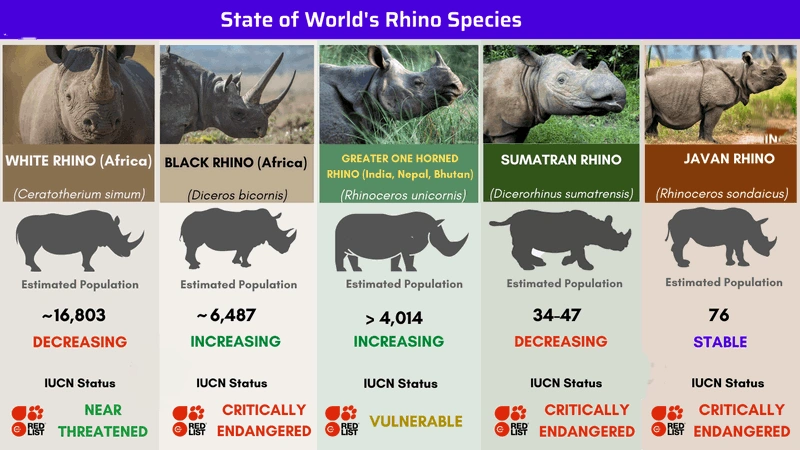Why in News?
Genetic analysis of 2,573 rhino horn samples has begun in Assam under the RhoDIS India programme. The samples, mostly from horns destroyed in 2021, are being analysed at the Wildlife Institute of India to aid Rhinoceros conservation.
Description:
Recent Study Highlights:
- Study analysed artwork and photographs spanning over 500 years.
- Shows decline in horn length due to trophy hunting and directional selection.
- Sumatran Rhino: Highest horn length decline.
- White Rhino: Lowest horn length decline.
- Similar pattern observed in:
- Elephants (tusk size).
- Wild sheep (horn length).
Threats Faced by All Rhino Species:
- Poaching for horns.
- Habitat loss due to human encroachment.
- Impact of directional selection from trophy hunting.
Directional Selection:
- Process where traits like large horns or tusks are selected against due to human hunting pressure.
- Leads to evolution of smaller horn sizes over generations.
Five Surviving Rhino Species:
| Species | Region | IUCN Status | Key Traits |
| Greater One-Horned Rhino (Indian Rhino) | India (Assam), Nepal, Bhutan, Pakistan | Vulnerable | Largest species; single black horn, folded skin |
| White Rhino | Northern & Southern Africa | Near Threatened (Southern) | Most populous; broad mouth |
| Black Rhino | Eastern & Southern Africa | Critically Endangered | Hooked lip, aggressive behaviour |
| Javan Rhino (Sunda Rhino) | Indonesia (Ujung Kulon NP) | Critically Endangered | Lesser one-horned; very rare |
| Sumatran Rhino | Indonesia (Sumatra, Borneo) | Critically Endangered | Smallest species; two horns |
Greater One-Horned Rhino – Details:
- Also known as Indian Rhinoceros.
- Identified by:
- Single black horn
- Grey-brown hide with prominent skin folds
- Largest among all Rhinoceros species.
Habitat & Behaviour:
- Grazers – eat grasses, aquatic plants.
- Found in swampy grasslands and floodplains.
- Often seen immersed in water.
Geographical Spread:
- India (Assam) – Kaziranga, Orang, Pobitora NPs
- Also in Nepal, Bhutan, and Pakistan
Legal Protection:
| Protection Law/Organisation | Status |
| IUCN Red List | Vulnerable |
| CITES | Appendix I |
| Wildlife Protection Act, 1972 (India) | Schedule I |

La Excellence IAS Academy, the best IAS coaching in Hyderabad, known for delivering quality content and conceptual clarity for UPSC 2025 preparation.
FOLLOW US ON:
◉ YouTube : https://www.youtube.com/@CivilsPrepTeam
◉ Facebook: https://www.facebook.com/LaExcellenceIAS
◉ Instagram: https://www.instagram.com/laexcellenceiasacademy/
GET IN TOUCH:
Contact us at info@laex.in, https://laex.in/contact-us/
or Call us @ +91 9052 29 2929, +91 9052 99 2929, +91 9154 24 2140
OUR BRANCHES:
Head Office: H No: 1-10-225A, Beside AEVA Fertility Center, Ashok Nagar Extension, VV Giri Nagar, Ashok Nagar, Hyderabad, 500020
Madhapur: Flat no: 301, survey no 58-60, Guttala begumpet Madhapur metro pillar: 1524, Rangareddy Hyderabad, Telangana 500081
Bangalore: Plot No: 99, 2nd floor, 80 Feet Road, Beside Poorvika Mobiles, Chandra Layout, Attiguppe, Near Vijaya Nagara, Bengaluru, 560040
